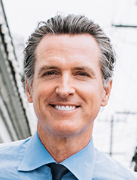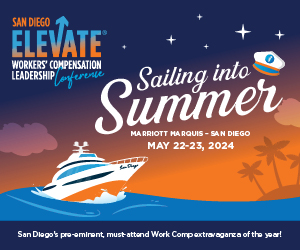News Articles
Monday, October 3, 2022
Newsom Shortens Window for Claim Decisions, Extends COVID Presumption
- State: California
- Topic: Top
- - Popular with: Legal
- - 0 shares
California employers will have less time to accept liability on certain presumptive injury claims and face penalties of up to $50,000 for unreasonably denying them, under a bill enacted by Gov. Gavin Newsom.

Gov. Gavin Newsom
The governor also extended the presumption that COVID-19 is compensable through 2024 and signed a bill giving the insurance commissioner more authority to meet with county prosecutors, insurers and self-insured employers to discuss potential fraud.
At the same time, the governor vetoed measures that would have expanded the post-traumatic stress disorder presumption to additional first responders and 911 dispatchers and expanded the skin cancer presumption to cover game wardens and park rangers.
Newsom signed SB 1127, by Senate President Toni Atkins, D-San Diego, without comment Thursday. The bill cuts the window for employers to determine liability on claims for injuries that are presumed compensable when suffered by first responders, to 75 days from 90 days. The shorter time frame applies to presumptions in Labor Code Sections 3212 through 3212.85, and 3212.9 through 3213.2.
The bill allows firefighters and peace officers to receive up to 240 weeks of temporary disability benefits for presumptive cancer claims rather than the 104 weeks of TD available to other injured workers.
And it creates a penalty equal to five times the amount of delayed benefits, capped at $50,000, for unreasonably denying any presumptive injury claim identified in Labor Code Sections 3212 through 3213.2. Lawmakers elected not to define what would constitute an unreasonable denial and charged the Workers’ Compensation Appeals Board with determining the reasonableness of a denial in accordance with the facts.
The bill's sponsor, California Professional Firefighters, said the new penalty will restore consequences for unreasonable denials that were gutted almost two decades ago as part of the reforms in the early 2000s. Prior to 2004, penalties for unreasonable delays and denials were 10% of the total award. The 2004 changes reduced the penalty to only 10% of the value of the benefits actually delayed or denied.
“SB 1127 strikes a balance by providing a real remedy for injured workers experiencing unreasonable denials, by ensuring that claims move forward in a timely manner for the benefit of the workers seeking treatment and the employers saving additional personnel costs to backfill the injured firefighter, and ensures that temporary disability awarded for a cancer claim is adequate to protect the injured firefighters over time as they battle their illness,” California Professional Firefighters said.
Opponents criticized the measure for cutting the time employers have to determine liability without also expediting time frames for gathering medical and legal evidence. For example, employers said they have to wait 10 days after a claim is filed to request a panel of qualified medical evaluators. The state has 10 days to issue a panel, and the injured worker has 10 days to strike a doctor from the list.
Once that 30-day process is completed and a doctor is selected for the med-legal exam, an appointment must be scheduled within 60 days and the medical report is due 30 days after the exam.
The California Workers’ Compensation Institute said that if claims administrators can’t get med-legal reports and other evidence within the 75 days afforded under SB 1127, they would have few options other than to issue provisional denials.
While the bill could lead to more provisional denials on some claims, CWCI said its review of claims from 2015 through 2019 found more than 90% of all accepted non-COVID-19 claims have a decision within 75 days.
“Thus, decreasing the investigation period for such claims would have very little impact in terms of expediting the compensability decision process,” CWCI said.
Employers also opposed earlier versions of the proposal to extend the COVID-19 presumption in AB 1751, which Newsom enacted Thursday, but removed their opposition after the bill was amended.
Assemblyman Tom Daly, D-Anaheim, amended AB 1751 in August to keep the COVID-19 presumption in place for only one more year — until Jan. 1, 2024. His earlier proposal would have maintained the presumption through Jan. 1, 2025.
The presumption is triggered if first responders are diagnosed with COVID-19 within 14 days of going to work. It applies to all other workers if they are diagnosed within 14 days of going to work at a site that is experiencing an outbreak.
Rand Corp. said its analysis of the COVID-19 presumption generated mixed results. The policy appeared to serve the goal of encouraging people to file claims for COVID-19, the research organization said. And it forced employers to expedite decisions.
“However, we did not hear that shortened timelines and quicker initial claims decisions meaningfully assisted workers in any specific manner, suggesting that these changes did not do much to promote the typical objectives of a workers’ compensation system,” Rand said.
Newsom also enacted another bill by Daly, AB 1681, clarifying conditions under which the representatives from the Department of Insurance can meet with prosecutors, carriers and self-insured employers to discuss potential fraud.
Current law allows the insurance commissioner to schedule meetings to discuss potential fraud with district attorneys and insurance carriers, but not self-insured employers who represent about one-third of the work comp market. AB 1681 allows self-insured employers to attend these fraud briefings and enjoy the same conditional immunity for libel and slander afforded to carriers and prosecutors.
Newsom’s support for presumptions wasn’t universal. While he extended one and is requiring employers to expedite decisions for other injuries presumed to arise from employment, he struck down two efforts to expand other presumptive injury statutes, citing a lack of evidence and concerns about a dangerous precedent of “unsubstantiated presumptions.”
He vetoed AB 334, by Assemblyman Kevin Mullin, D-South San Francisco, which would have given peace officers for the Departments of Fish and Game and Parks and Recreation a presumption that skin cancer is compensable.
The skin cancer presumption is currently limited to lifeguards working for the state Department of Parks and Recreation, and lifeguards employed by a city, county or political subdivision of the state.
Newsom said in his veto message that a presumption is not required for an occupational disease to be compensable.
“Such presumptions should be provided sparingly and should be based on the unique hazards or proven difficult of establishing a direct relationship between a disease or injury and the employee’s work,” Newsom wrote. “Although well-intentioned, the need for the presumption envisioned by this bill is not supported by clear and compelling evidence.”
Newsom also vetoed SB 284, by Sen. Henry Stern, D-Canoga Park, which would have included additional firefighters, peace officers and safety dispatchers in a PTSD presumption that took effect in 2020. The bill applied to firefighting members of the state departments of Military, Developmental Services, State Hospitals and Veterans Affairs, as well as Justice Department and state hospital security officers.
Newsom in 2019 enacted SB 542 by Stern, creating a PTSD presumption for local, state and federal firefighters; sheriffs and deputies; police officers and state troopers; community college and school district police; arson investigators; parole officers; and correctional workers. The presumption applies to injuries occurring on or after Jan. 1, 2020, and is scheduled to sunset Jan. 1, 2025.
He said in his veto message for SB 284 that the PTSD presumption “is a careful step acknowledging the increasingly hazardous conditions to which the subject class members are exposed, balanced against the principles of workers’ compensation law that dictates conservatism with respect to presumptions and psychiatric injuries.” As such, he said he enacted SB 582 to allow for a study of the benefits and effectiveness of the PTSD presumption.
“Expanding coverage of the PTSD injury presumption to significant classes of employees before any studies have been conducted on the existing class for whom the presumption is temporarily in place could set a dangerous precedent that has the potential to destabilize the workers’ compensation system going forward, as stakeholders push for similarly unsubstantiated presumptions,” Newsom said in his veto message.
Researchers with Rand Corp. said in an analysis of SB 542 prepared for the Commission on Health and Safety and Workers’ Compensation that their findings substantiate a central rationale for the PTSD presumption, “which was to remove avoidable barriers to proving that a mental health claim was work-related and to receiving compensation for mental health treatment.”
At the same time, Rand calculated that the presumption could increase annual costs by $50 million on the low end to $347.1 million on the high end.
Today’s News
- Neb. - Divided Supreme Court Reinstates Occupational Disease Claim for COVID-19 Top 04/23/24
- Texas - High Court Orders Further Proceedings on Truck Driver's Status as 'Employee' SOUTH 04/23/24
- N.Y. - Court Upholds Denial of Summary Judgment on Claims From Alleged Elevator Mishap NORTH 04/23/24
- N.Y. - No Summary Judgment for Worker on Labor Law Claims NORTH 04/23/24
- S.C. - Senate Passes Resolution to Approve Electronic Payments SOUTH 04/23/24
- Colo. - Committee Passes Bill to Strip State's Right to Self-Insure WEST 04/23/24
- Calif. - DWC Updates Time-of-Hire Notice WEST 04/23/24
Advertisements
Now Trending
- Workers' Compensation News
-
Calif.
Chiropractor Sentenced to More Than
54 Years, Fined…
Posted on Apr 16, 2024
-
Calif. Court
Upholds Summary Dismissal of
Worker's Claims for Retaliation,…
Posted on Apr 17, 2024
-
Calif. WCIRB
Approves Recommendation for 0.9%
Rate…
Posted on Apr 18, 2024
-
Calif. Committee
Passes Bill to Expand 4850…
Posted on Apr 22, 2024
-
Calif. Committee
Passes Bill to Revise Poster…
Posted on Apr 19, 2024
-
Calif. Cal/OSHA
Cites Construction Company $371,100
for Fatal Trench…
Posted on Apr 22, 2024
-
Calif.
Appropriations Committee Schedules
Hearing on E-Signature…
Posted on Apr 22, 2024
-
Minn. Supreme
Court Upholds Award to Social
Worker for…
Posted on Apr 19, 2024
-
Ark. Worker Not
Entitled to Additional Benefits
After Date of…
Posted on Apr 22, 2024
-
La. Court
Overturns PTD Award for Worker With…
Posted on Apr 17, 2024
Jobs
Upcoming Events
May 5-8, 2024
Risk World
Amplify Your Impact There’s no limit to what you can achieve when you join the global risk managem …
May 13-15, 2024
NCCI's Annual Insights Symposi
Join us May 13–15, 2024, for NCCI's Annual Insights Symposium (AIS) 2024, the industry’s premier e …
May 13-14, 2024
CSIA Announces the 2024 Annual
The Board of Managers is excited to announce that the CSIA 2024 Annual Meeting and Educational Con …
Social Media Links
c/o Business Insurance Holdings, Inc.
Greenwich, CT 06836





No Comments
Log in to post a comment